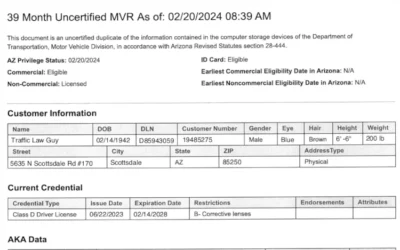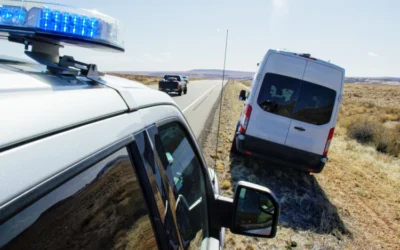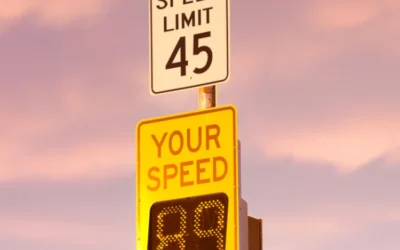Racing and Exhibition of Speed Tickets
Make the best of a bad situation. Get your questions answered and find out your options with a free consultation.
One law for two distinct charges
Racing vs. Exhibition of Speed – Same Law, Different Facts
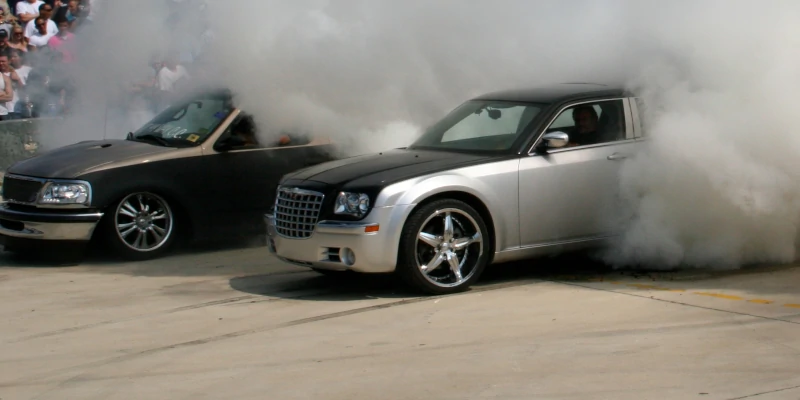
Racing
Police typically issue a racing ticket when there are 2 or more cars involved. We generally see a racing ticket resulting from two cars racing each other away from a stoplight or engaging in rolling-start race on the highway.
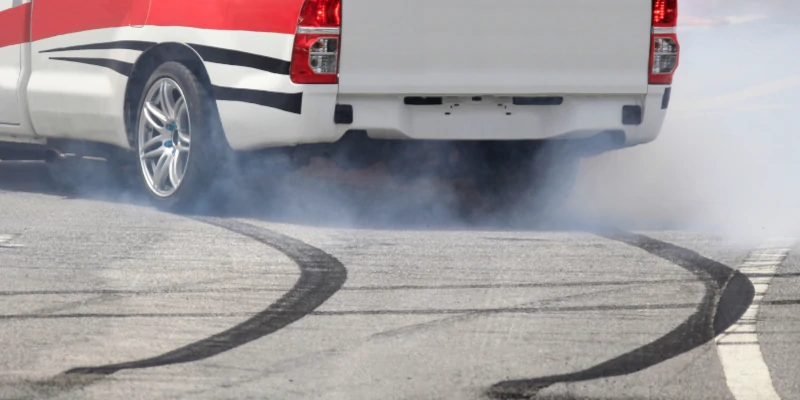
Exhibition of Speed
We usually see exhibition of speed tickets that involve only a single car. Things like squealing tires around a corner, doing a burnout, doing donuts, or accelerating hard away from a stop sign or stop light can result in an exhibition of speed ticket.
Vehicle Impound
How Long Is The Impound?
Arizona law says that if the police believe a driver was racing or engaging in an exhibition of speed, then the officer shall impound the vehicle. A big problem with this, in our mind, is it allows for the impounding of an innocent driver’s vehicle without any due process (surprise, the courts don’t care). The impound is for 20 days. After the 20 days run, the driver may go retrieve the vehicle with their valid driver license and proof of registration.
Getting A Car Out Of Impound
If the person cited with racing is the only owner of the vehicle at the time of impound, the car won’t be released until the impound time runs. After the 20 days run, the owner may go retrieve the vehicle with their valid driver license and proof of insurance and registration.
If there is another owner besides the person who was driving when the car was impounded, that owner can get the car back anytime. Here again, the owner will need to show a valid license and proof of insurance and registration.
See A.R.S. 28-3511(A)(3) for the impound law.
a related charge
Aiding or Abetting
In 2021, the charge of aiding or abetting was added to the racing statute. The aiding and abetting addition is targeted at people who facilitate or encourage racing or exhibition of speed. The statute reads:
A person who knowingly aids or abets another person in the commission of a violation of this section is guilty of a class 2 misdemeanor, except that a second or subsequent violation within a period of twenty-four months is a class 1 misdemeanor
See A.R.S. 28-708(C)
Examples of aiding or abetting include:
-
- Drivers who park their vehicles to block access to an intersection so that another driver may do donuts in the intersection.
-
- People who encourage or “egg on” drivers in a race or intersection takeover.
We have seen over-zealous applications of the aiding and abetting law result in innocent bystanders being arrested. The situation usually involves a driver who happens to be in the area when something goes down, and law enforcement wrongfully stops them and arrests them. We have had good luck with getting the charges dismissed in these situations.
If someone is charged with aiding or abetting, they may receive a second criminal charge for obstruction as well if they were blocking the road in any manner.
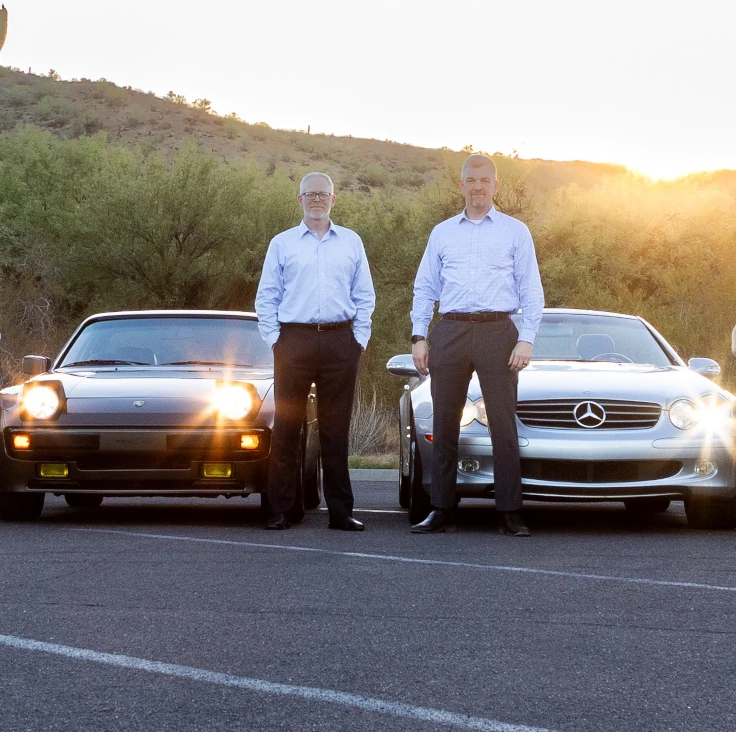
Our Record Speaks For Itself
- Over 100 5-star reviews online
- Over 2,200 cases completed
- Experienced in over 160 courts in Arizona
- 36 years of combined attorney experience
YOUR CASE IS OUR PRIORITY
Small Law Firm Attention, Big Firm Results
Most law firms dabble in traffic tickets, but traffic tickets are our focus. We know traffic law inside and out, we know our way around the MVD, and we are well respected in the dozens of courts we frequent. Let our knowledge and experience work for you.

The Politics Of Street Racing
Local governments in Phoenix and the surrounding areas are particularly focussed on racing-related activity these days. This is due to a combination of factors including:
Complaints From Residents And Business Owners
From what we understand having interviewed many police officers, this is the main driver of the increased law enforcement efforts. When a parking lot takeover occurs, it generates many 911 calls from the nearby business owners as well as passersby. When an intersection takeover occurs, the non-participating motorists, who are caught up in the chaos and who cannot get where they want to go, start calling 911. The police will get dozens of calls from each event. There may be a dozen related events taking place in a single evening at different locations around the valley. This could result in hundreds of 911 calls related to street racing in a single evening. Local business owners have been pressuring the Phoenix Police Department and other law enforcement agencies to take increased action to curb street racing.
Federal And State Funding
Phoenix has a task force dedicated to combatting street racing that was formed in early 2019. At the start of 2020, Phoenix Police Department received a $100,000 grant to stop street racing. This $100k is being used to fund a task force of over 25 people, including aircraft and helicopter usage. We have seen in our cases examples of the police calling in air support to track a suspect who tries to flee at high speed from the police. The police are willing to put forth considerable resources to prevent street racing. Phoenix also receives a substantial amount of money from the State to put towards pursuing street racing activities. The street racing task force works with law enforcement entities adjacent to Phoenix as well.
Serious Accidents
There have been a number of accidents rresulting from alleged street racing including for example:
-
- In February 2020, two cars were street racing on the SR-51 at speeds in excess of 100 mph. One of the drivers in an Audi TT lost control, ran off the highway and collided with a concrete retaining wall. The car disintegrated, killing the 18-year-old driver and scattering car parts all over the highway.
-
- In August 2019, a Scottsdale man driving a Lamborghini Gallardo was engaged in a street race with a BMW at over 100 mph. The 22-year-old driver of the BMW lost control and collided with another car, killing the 68-year-old female driver. The Scottsdale man was charged with second-degree murder and aggravated assault.
Increased Media Coverage
If you do a search for illegal street racing in Phoenix, you will find no shortage of stories with pictures of drivers doing donuts with people hanging out the windows of the car in a cloud of smoke. You will also read stories of drivers losing control while doing burnouts and crashing into spectators. There are also plenty of allegations of drug use, drug sales, shootings and impaired driving associated with these events. While not all street racing is this extreme, the pictures and stories leave an impression with readers, and with the legislators.
Popular Police Targets
Intersection Takeovers or Street Takeovers
A large group of drivers congregates at an intersection, or even the middle of a street, blocking traffic from all directions. The drivers surround the intersection and prevent normal traffic from passing through the intersection. Then drivers, one or two at a time, enter the middle of the intersection, known as the “pit” and engage in what the police call “rotational burnouts” – basically smoking the tires while traveling a roughly circular path amongst a crowd of onlookers. Police target intersection takeovers because it generates 911 calls, blocks traffic, and from time to time, someone gets injured or killed.
Parking Lot Takeovers
Much like an intersection takeover, but in a parking lot. Large parking lots like those found in strip malls, shopping centers, or grocery stores are popular locations. The drivers form what could again be described as a “pit” – they gather around in a circular shape creating a space in the middle where drives enter and perform donuts, or what the police describe as rotational burnouts. We often see charges for reckless driving arising from these events that take place on private property.
Street Racing or Drag Racing
The police believe that street racing is often a byproduct of intersection or parking lot takeovers. When drivers are leaving the takeovers, they often engage one another in a drag race. This could be a race from a stop, such as from a red light, or a rolling start. Here again, this results in 911 calls from other motorists, homeowners, and business owners.
Frequently Asked Questions
What is the court process for a racing or exhibition of speed ticket?
Each case is unique and your specific circumstances will determine what may happen, but the basic sequence of a case is this:
1. Arraignment
The date on your ticket is the arraignment date. This is when you, the defendant (or your attorney) appears before a judge and enters a plea of not guilty or not guilty.
2. Pretrial Conferences
A Pretrial conference is a meeting between the prosecutor and the defendant (or your attorney) to see if a resolution can be reached and to make sure the defendant is getting the information they need (discovery).
3. Discovery
Discovery just means information gathering. It involves requesting and reviewing evidence which may include reports, witness statements, video, radar or lidar calibrations, and more.
4. Negotiation
Negotiation, which can include a deviation request, is essentially making an argument to the prosecution requesting a reduced charge based on the information uncovered during discovery and other mitigating details, such as the defendant’s driving record or background.
5. Resolution
This could involve a change of plea hearing if an agreement has been reached with the prosecution, or a trial.
What can happen if you are found guilty of racing or exhibition of speed? (FIRST conviction)
Possible consequences:
- A class 1 misdemeanor conviction
- Fines up to $2,500 plus surcharges and court assessments that could nearly double the total fine, plus another $1,000 penalty.
- Up to 6 months in jail.
- Up to 3 years probation
- The judge may suspend your driving privileges for up to 90 days.
- May be ordered to perform community resitution (community service)
Likely consequences:
- Class 1 misdemeanor conviction.
- Mandatory fines of at least $1,493
- Jail time is rare, but it does happen. We most often see jail in city courts in Maricopa County.
- Probation is rare.
- We don’t usually see license suspension from the court (there may be a points suspension)
Collateral consequences:
- 8 points on your driving record.
- Increased insurance rates
- Traffic Survival School
- Immigration issues
- License suspension depending on the driver’s history and accumulation of points
- Having to disclose a criminal conviction on job applications
What are the penalties for a SECOND racing or exhibition of speed conviction?
A conviction that occurs within 24 months of another racing or exhibition of speed conviction counts becomes a class 6 felony. A driver who is convicted a second time faces the following consequences:
Minimum consequences for a second conviction include:
- Could be charged as a misdemeanor instead of a felony.
- Mandatory fine of not less than $500. Add in court surcharges and assessments, and that gets close to $1,000.
- Mandatory penalty assessment of $1,000. See A.R.S. 12-116.11(A).
- Mandatory 10 days jail (assuming no prior felony convictions).
- 1-year mandatory license suspension. May be eligible for restricted license after 45 days.
- 8 points on the license and a Traffic Survival School assignment.
Maximum potential consequences for a second conviction include:
- All of the minimum consequences, plus:
- Fines up to $150,000 (for a class 6 felony). If charged as a misdemeanor, the potential maximum fine is $2,500 plus surcharges. Surcharges and court assessments will nearly double the fine amount.
- Up to 2 years in prison.
- Probation.
- May be ordered to perform community restitution (community service).
Is racing or exhibition of speed a jury eligible charge?
No. If a driver goes to trial on a racing or exhibition of speed case, it will be a bench trial. This means a judge will decide the issue of whether the driver was racing or engaging in an exhibition of speed.
How many points is racing or exhibition of speed in AZ?
Racing and exhibition of speed are 8-point violations. Even if you don’t have an Arizona driver license, the Arizona Department of Transportation (ADOT) will create a record for you and assign points. Then Arizona will make this information available to other states. The result is that an excessive speed conviction in Arizona may follow you to your home state.
If a racing or exhibition of speed conviction hits your driving record, ADOT will require you to take an 8-hour traffic survival school class to avoid a suspension. If you already have points, then you might just get a straight suspension.
Keep in mind each state has its own points systems, and they can differ substantially.
Will I have to appear in court?
If you hire an attorney, your attorney can often attend the pretrial conferences without you. Some courts require that a defendant attend pretrial conferences, but this is the exception rather than the rule. We represent many clients from out-of-state who never return to Arizona or attend court. You can discuss whether or not your presence is necessary with your attorney. If your case goes to trial, you will almost certainly need to attend the trial in person.
How long does a racing or exhibition of speed case take?
Three to four months is usually a good estimate of time. Most courts want the case either resolved by a plea agreement or set for trial after about 3 pretrial conferences. Pretrial conferences are usually about 30 days apart.
Can I set aside or expunge a racing or exhibition of speed conviction?
Arizona only permits expungement in limited circumstances. Racing is not one of those circumstances.
The answer to “can you set aside a racing or exhibition of speed conviction” is “there is a good chance you can.” See our page about setting aside convictions for more details.
Arizona now has a pathway to “seal” the records related to a criminal speeding conviction. This is not the same as an expungement, but it comes close. You can read more about sealing of criminal records here.
Contact Us
Let’s see what we can do about that ticket.
5635 N. Scottsdale Rd. #170, Scottsdale, AZ 85250
M-F: 9am-5pm, S-S: Closed
Latest Posts
How To Get A Copy Of Your Driving Record In Arizona
How To Get A Copy Of Your Driving Record In Arizona Here's how to get a copy of your driving history from the Arizona Department of Transportation.What you are looking for Driver License Motor Vehicle RecordMake Sure You Get The Right Record There are two records that...
Where To Pull Over For The Police
Where To Pull Over For The Police If you are ever pulled over by the police, better to have a plan in advance. Here are some Do's and Don'ts.Pulling over for the police The Do'sDO Pull Over As Soon As Possible When police light up a driver, they expect the driver to...
3 Things Arizona Drivers Need To Know About Speed Limits
You can be charged with a crime for exceeding the speed limit by more than 20 mph. Arizona has a criminal charge called Excessive Speed, a.k.a. criminal speeding. If you are driving more than 20 mph over the posted speed limit, you can be charged with excessive speed....

